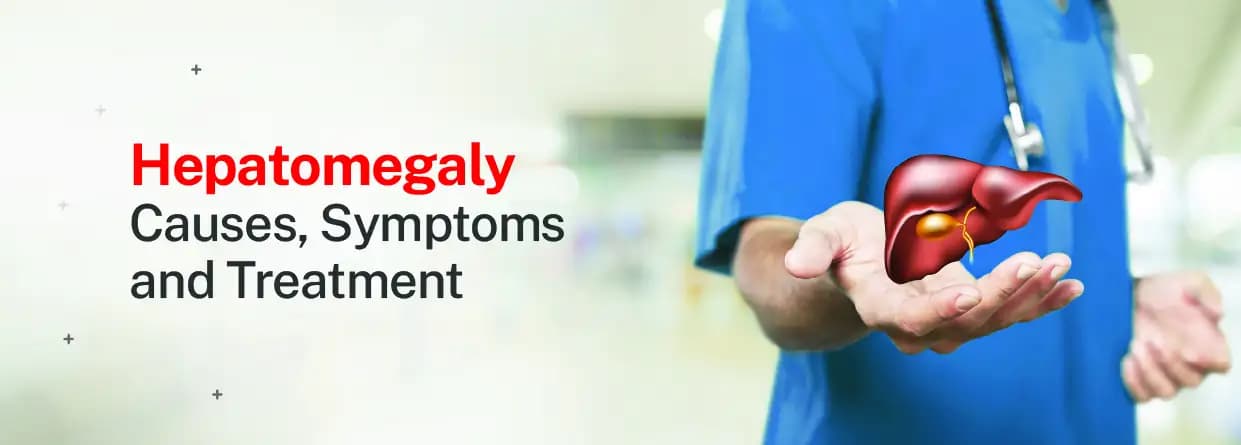
Hepatomegaly (hep-uh-toe-MEG-uh-le) with fatty liver is a condition where the normal size of the liver becomes too big due to fat deposition. When the liver becomes enlarged, most people feel as though they are full on the right side of their body or feel discomfort in that area.
Have you recently been diagnosed with hepatomegaly? It’s natural to have questions running through your mind, like, Is hepatomegaly serious? Does it require surgery? What are the risks? How dangerous is an enlarged liver? These concerns can feel overwhelming, but understanding the condition is the first step toward clarity and peace of mind. In this blog, we’ll explain everything about hepatomegaly, it’s symptoms and treatment. However, kindly note that it is for informational purposes only. For expert consultation, book your appointment with Best Gastroenterologist In Jaipur at CK Birla Hospitals.
The liver is the most important organ in our body, helping in detoxification and digestion. But when it grows beyond its normal size, it’s often a sign of an underlying serious liver complexation that requires attention.
Hepatomegaly (hep-uh-toe-MEG-uh-le) with fatty liver is a condition where the normal size of the liver becomes too big due to fat deposition. When the liver becomes enlarged, most people feel as though they are full on the right side of their body or feel discomfort in that area. Rather than a disease, an enlarged liver is a sign of an underlying liver problem, including liver disease, congestive heart failure or cancer.
|
Measurement |
Normal Liver |
Enlarged Liver (Hepatomegaly) |
|
Size (Length) |
12–15 cm (4.7–5.9 inches) in adults |
> 15.5 cm (6.1 inches) in adults |
|
Weight |
1.2–1.5 kg (2.6–3.3 lbs) in adults |
> 1.5 kg (3.3 lbs) |
|
Thickness (AP Diameter) |
10–12.5 cm (3.9–4.9 inches) in right lobe |
> 12.5 cm (4.9 inches) |
|
Span (midclavicular line) |
6–12 cm (2.4–4.7 inches) |
> 12 cm (4.7 inches) |
Hepatitis:In medical terms, inflammation of the liver is called hepatitis. It occurs as a result of toxicity, inflection or alcohol-induced liver damage.
Alcohol-related liver disease (ALD): If you consume an excess amount of alcohol, it can lead to a buildup of fat cells in the liver, called steatosis. This condition interferes with the liver’s ability to carry out its important function. And, in most cases, ALD may lead to severe liver scarring, or cirrhosis.
Non-alcohol-related fatty liver disease (NAFLD): This condition also causes steatosis, but it is just opposite to ALD. It happens due to diabetes or diets that are high in fat and cholesterol.
Liver cancer: Cancer that originates in the liver is called primary liver cancer, while cancer that spreads to the liver from other parts of the body is called secondary liver cancer
Heart failure: The portal vein is the vein whose work is to supply blood to the liver. Heart failure can occur due to poor blood circulation that increases pressure on the portal vein. Over time, this can lead to enlargement of the liver.
Borderline hepatomegaly, or a slightly enlarged liver, can be dangerous depending on the underlying cause. A slightly enlarged liver may not be a major health concern in people with NAFLD, but it may indicate a need for lifestyle changes.
People who are diagnosed with it experience these symptoms, like:
The treatment for hepatomegaly depends on the underlying cause, like:
|
Condition |
Treatment Options |
Key Notes |
|
No specific antiviral treatment. |
Most people recover within weeks to months. Rare cases may require a liver transplant in acute liver failure. |
|
|
antiviral medications for chronic cases. |
Acute cases often don’t need treatment unless complications occur. |
|
|
Hepatitis C |
Direct-acting antiviral drugs for chronic infection (12–24 weeks) |
Treatment helps prevent liver damage and increase long-term survival. |
|
Hepatitis D |
Pegylated interferon alpha to slow progression. |
Liver transplant may be needed in advanced cases. |
|
Alcohol-Related Liver Disease (ALD) |
Supervised medical detox. Treating co-occurring mental health conditions. |
Behavioural therapies such as CBT, motivational enhancement, and family therapy are common. Long-term sobriety support is crucial. |
|
Non-Alcoholic Fatty Liver Disease (NAFLD) |
Dietary changes (reduce cholesterol and fats). |
Weight loss, blood sugar control, and managing type 2 diabetes are key. |
|
Achieve and maintain a moderate weight. |
||
|
Liver Cancer |
Chemotherapy, radiation therapy, or immunotherapy. |
Surgery to remove tumours or a liver transplant may be required, depending on the cancer type and stage. |
|
Heart Failure (with Hepatomegaly) |
Lifestyle changes (quitting smoking, limiting caffeine, managing stress). Physical activity, nutritious diet, weight management. |
Medications like ACE inhibitors, beta-blockers, diuretics, and sometimes surgery for blocked arteries. Managing underlying heart conditions helps reduce liver swelling. |
Hepatomegaly (enlarged liver) can be serious depending on the cause. It’s important to see a doctor to find out what’s behind it and get the right treatment.
Hepatomegaly with fatty liver means your liver is enlarged due to fat buildup. This can happen with poor diet, obesity, or alcohol use, but it’s treatable with lifestyle changes and medical care.
Yes, cirrhosis can cause hepatomegaly in its early stages as the liver tries to repair itself. Over time, the liver may shrink as damage progresses. Early diagnosis is key to managing it.
Written and Verified by:

Dr. Abhinav Sharma is the Director of Gastroenterology Dept. at CK Birla Hospital, Jaipur with over 16 years of experience. He specializes in advanced therapeutic GI endoscopic procedures and the treatment of complex gastrointestinal disorders.
Similar Gastro Science Blogs
Book Your Appointment TODAY
© 2024 RBH Jaipur. All Rights Reserved.